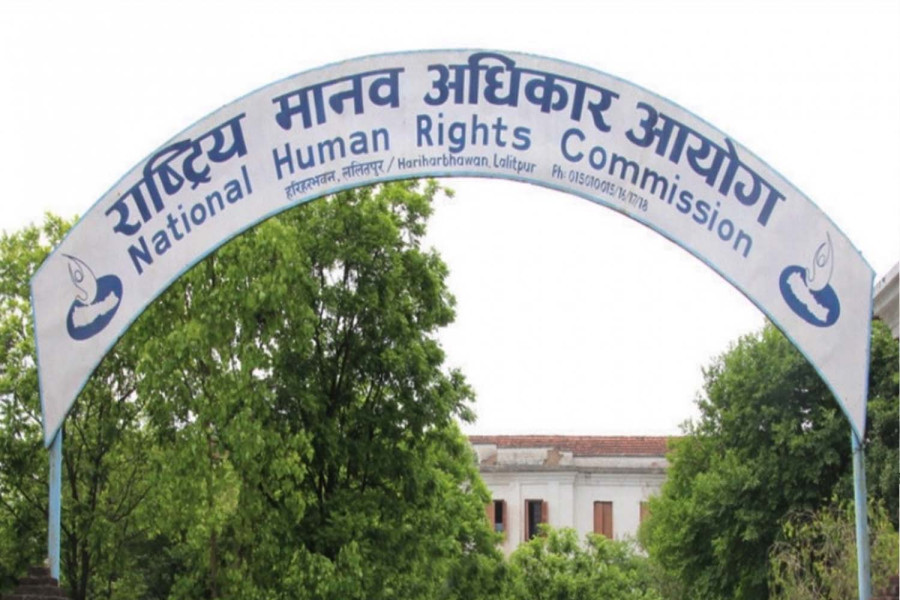National
Rights watchdog retains ‘A’ status—for now
Global alliance of rights organisations says it made the decision in view of pending court hearings on disputed appointments.
Binod Ghimire
The National Human Rights Commission, the constitutional rights watchdog, has dodged a bullet.
The sub-committee on accreditation (SCA) of the Global Alliance of National Human Rights Institutions has decided not to downgrade its global "A" status—at least for the time being.
After a review on October 25, it decided to roll back its own decision last year to lower the status of Nepal's constitutional human rights watchdog to "B" grade, saying it was now satisfied with the information provided by the commission that demonstrates full compliance with the Paris Principles. The Paris Principles (Principles Relating to the Status of National Human Rights Institutions) set out the essential standards for national human rights institutions to be recognised as credible and effective.
In its earlier assessment in 2021, the sub-committee had decided to undertake a special review of the accreditation status based on complaints from a group of civil society organisations, which alleged that the appointment of the chairperson and members in the commission was inconsistent with domestic laws and essential requirements of the Paris Principles.
In another assessment held in the same year it decided to defer the review to its second session of 2022, considering that the writ petitions challenging the appointments were pending in the Constitutional Bench of the Supreme Court.
In October 2022, it recommended that the global alliance downgrade the NHRC to "B" category. Losing the "A" status would mean the commission would not be allowed to put forth its opinion in deliberations at the UN Human Rights Council and vote on its decisions. Similarly, only such countries that have "A" rated commissions can contest or vote for the leadership position in GANHRI and the Asia Pacific Alliance of Human Rights Institutions.
The “A” status of the commission is one of the key factors that helped Nepal be a member of the UN Human Rights Council for the second consecutive term, according to Bed Bhattarai, a former secretary of the commission.
In its latest decision, the sub-committee has taken note that the Supreme Court has yet to pass a final verdict on the petitions.
"The SCA is satisfied that the information provided by the NHRCN [National Human Rights Commission Nepal] demonstrates full
compliance with the Paris Principles,” reads a point of the alliance's decision forwarded to the commission.
"The SCA commends the efforts undertaken by the commission to advocate for amendments to the National Human Rights Commission Act to address the SCA’s recommendations. The SCA encourages the commission to continue to advocate for amendments to the NHRC Act to provide for a selection and appointment process that complies with the Paris Principles.”
Defending itself before the SCA on October 25, the commission claimed that the government was positive about introducing a bill to amend the commission’s Act to empower the commission in line with the Paris Principles.
In his defence, the commission’s member Surya Dhungel had claimed that the commission deserves to retain its “A” status for the effective role it has been playing in protecting and promoting human rights in close cooperation with civil society.
Talking to the Post, Dhungel said that the sub-committee was convinced with his defence. “We would like to assure you all that the commission would redouble its efforts. We will focus on expediting the processing of the proposed amendment in the commission's Act through Parliament, in compliance with the Paris Principles,” he told the Post.
Issuing a statement on Wednesday, the commission said that following the decision, human rights defenders and the community were even more committed to work to strengthen the situation of human rights in the country.
In its decision, the SCA has reminded that the human rights institutions accredited with “A” status should take reasonable steps to enhance their effectiveness and independence.
The commission has been dragged into a controversy ever since the Constitutional Council led by then-prime minister KP Sharma Oli nominated chairpersons and members to various constitutional bodies, including the NHRC, based on a revision to the Constitutional Council Act enforced through an ordinance on December 15, 2020.
After the Council’s nominations, President Bidya Devi Bhandari on February 3, 2021 appointed the chair and four commissioners to the NHRC. They were appointed without going through parliamentary hearings in the absence of the House of Representatives.
Over half a dozen writ petitions challenging the ordinance and the appointment process are sub judice in the Supreme Court. The hearing on the petitions has been slated for December 6.
The SCA has noted that the proposed amendment bill provides for the advertisement of vacancies at the commission and the establishment of a shortlisting committee of three members ‘who have made distinguished contributions in the fields of law, justice, human rights and social sector’.
"The SCA is of the view that this provision, if passed, will work towards addressing the SCA’s concerns on the selection and appointment process," it said. “The SCA encourages the commission to ensure that the Bill also establishes mechanisms to support pluralism and diversity among its members, including gender and other marginalised groups.”
Former officials expressed happiness at the commission's retention of its “A” status. “It is good that the SCA has taken into consideration the fact that the apex court is yet to test the legality of the appointments,” Bhattarai told the Post.
"Now the government must present the amendment bill in Parliament to make the commission more powerful and more effective,” he said.




 13.12°C Kathmandu
13.12°C Kathmandu














